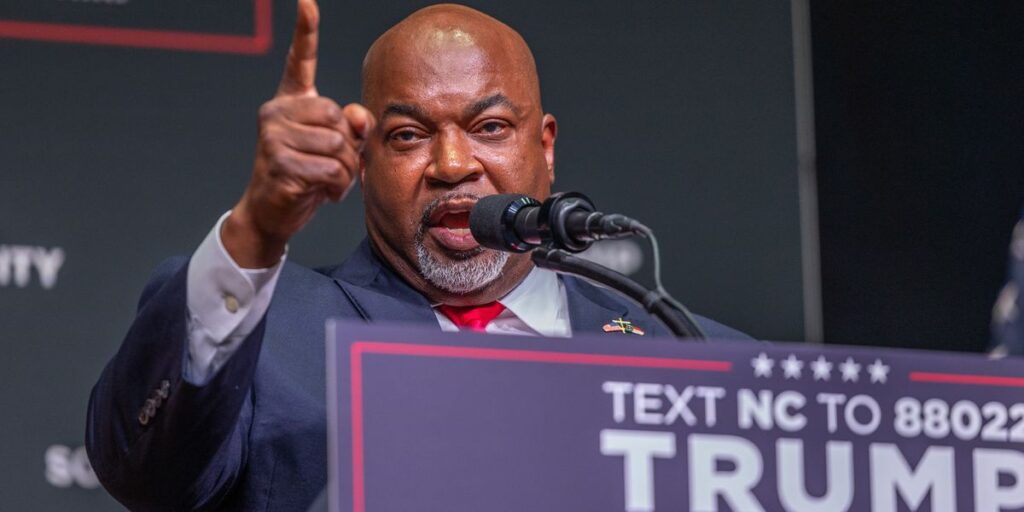In December 2018, North Carolina Republican gubernatorial nominee Mark Robinson made controversial comments that have resurfaced as voters approach a crucial election. Robinson, who currently serves as the lieutenant governor, recorded a video in which he claims that children who experience sexual assault will ultimately grow up to be “monsters” capable of committing horrific acts. His comments emerged during a lengthy, disjointed monologue that revolved around his views on morality, specifically contrasting the teachings of Jesus Christ with a “homosexual lifestyle,” which he linked to the abuse of children. Robinson’s rhetoric reflects a disturbing blend of prejudice and a belief in moral decay, as he suggests that societal acceptance of certain lifestyles contributes to a crop of individuals who might later inflict harm or violence.
Despite the offensive nature of his remarks, which continue to be available on his social media platforms, Robinson’s campaign has remained silent regarding the reasoning behind these statements or their ongoing visibility. His candidacy has faced increased scrutiny following a CNN report revealing troubling remarks he made on a pornographic forum, where he referred to himself as a “black Nazi” and shared inappropriate personal fantasies. These revelations were damaging, not only alienating voters but drawing criticism even from former allies such as Donald Trump, who once praised Robinson as a strong political candidate but has since distanced himself amid the controversy. The fallout has resulted in a dramatic decline in Robinson’s support, leading to significant resignations within his campaign team and office.
Robinson’s history of crude and controversial comments is not a new phenomenon; he has a long-standing record of making offensive statements that touch upon various sensitive topics, including race, gender, and sexuality. His past reception within the Republican Party has proved volatile, especially within the context of a pivotal election season. With Trump now distancing himself from Robinson after endorsing him earlier in the race, the dynamics within the Republican party appear fragile, particularly as many members are apprehensive about remaining associated with Robinson amid rising public backlash. The party’s hesitance to support him underscores a broader concern about electability in what is considered a pivotal swing state.
The upcoming gubernatorial election in North Carolina has the potential to significantly shape the political landscape as the incumbent, Democrat Roy Cooper, is term-limited. Polling indicates that Robinson is trailing behind his opponent, Democrat Josh Stein, by a notable margin. Recent data from polling aggregator FiveThirtyEight shows Stein holding a 13-point lead in the race, prompting analysts to categorize it as “likely Democrat.” This shift in voter sentiment comes at a time when both major party figures, including Trump and Democratic presidential nominee Kamala Harris, are concentrating efforts in North Carolina, recognizing the importance of this state as a battleground in the larger electoral strategy.
As the contest heats up in the final days leading to the election, both Trump and Harris are ramping up their campaigning efforts in North Carolina. Trump is scheduled to hold an event in Rocky Mount, while Harris will be campaigning in Raleigh, indicating that both candidates are eager to mobilize their respective bases to secure a victory. Given Robinson’s previous statements and his conduct, the perception among voters may play a critical role in determining the election’s outcome. There is a sensed urgency as both parties strive to consolidate their influences in a state where demographic shifts and political ideologies are constantly evolving.
Robinson’s contentious remarks may also illuminate a broader issue of how candidates in both parties navigate and respond to allegations and controversial statements during election seasons. The implications of his statements reverberate throughout the campaign, exposing potential vulnerabilities not only for Robinson but also for the Republican Party at large, as they must reconcile his extreme beliefs with the party’s mainstream values and public perception. This election serves as a litmus test, highlighting the struggle between personal beliefs and responsible representation, ultimately reflecting the values that North Carolina voters seek in their governance. With a rapidly approaching election day, the fate of Robinson’s campaign epitomizes the complexities of electoral politics today.

